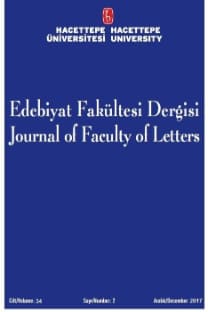Annihilation of history and fear of the past in Oya Baydar’s The General of the Garbage Dump
Oya Baydar’ın Çöplüğün Generali romanı, düşsel bir ülkedeki distopik bir gelecekte geçmektedir. Bu düşsel ülkede, bir bilim adamı elli önce yazdıklarını yayımlamadan gizemli bir şekilde ortadan kaybolan bir romancının notlarını bulur. Baydar’ın başkişisi toplumsal belleğin devlet eliyle oluşturulduğu, siyasi baskı altındaki bir toplumda yaşamaktadır. Yanılsamalarla dolu bu politik gerçekliği yaratmak için, herkese belleklerini silen bir hap verilmektedir. Böylece toplumun tüm bireyleri belleklerini yitirerek resmi tarihin sözde “büyük patlama” olarak adlandırdığı olaydan sonra yazdığı tarihi kabul eder hale gelecektir. “Büyük patlama”dan önceki tarih toplumsal bellekten silinmiştir. Bilim adamı, büyük patlamadan önceki tarihe ilişkin notları bulduktan sonra, “silinmiş bir geçmiş”in varlığını fark eder ve belleğini aktif tutmak için her gün verilen zevk haplarını almayı reddeder. Baydar’ın üslubu ve romanın bunaltıcı atmosferi Çöplüğün Generali’nin, taşıdığı karşı ütopya özellikleri, yanılsamalarla dolu gerçeklik ve devlet baskısı nedeniyle doğrudan George Orwell’in 1984 ve Aldous Huxley’in Cesur Yeni Dünya romanlarıyla karşılaştırılmasına neden olmaktadır. Bu nedenle bu çalışma bu romanlar arasında karşılaştırmalı bir çalışmayı ve tarihin yeniden oluşturulmasında “korku”nun bir devlet aygıtına dönüşüp dönüşmediğini sorgulamayı amaçlamaktadır.
Oya Baydar’ın Çöplüğün Generali romanında geçmiş korkusu ve Tarihin yok edilişi
The General of the Garbage Dump [Tr. title: Çöplüğün Generali] is a novel by a prominent Turkish novelist, Oya Baydar. It is set in a dystopian future in an imaginary country where a scientist finds the lost manuscripts of a novelist who vanished fifty years ago without publishing his novel. Baydar’s protagonist is in the midst of a politically oppressed society in which a collective social memory is created by the state. To create this illusionary political reality, everybody is given a pleasure pill that annihilates memory, in order to enable the whole society to remember and acknowledge an official history of the country after a so-called “big bang”. The history before the “big bang” is deleted from the social memory. After finding the manuscripts about the history before the big bang, the protagonist begins to find out about the “deleted past” and rejects having the pleasure pills every day to keep his memory active. Baydar’s style and her novel’s gloomy atmosphere invite a direct comparison of The General of the Garbage Dump to George Orwell’s 1984 and Aldous Huxley’s Brave New World in terms of the elements of dystopian novel, illusionary reality and state oppression. This paper, therefore, aims to present a comparative reading of these novels and question whether “fear” is a tool for state oppression to re-create history.
___
- Althusser, Louis. (2007). Politics and History: Montesquieu, Rousseau, Marx. Translated by Ben Brewster. London: Verso.
- Baydar, Oya. (2009). Çöplüğün Generali. Istanbul: Can.
- Bradshaw, David. (2004). “Introduction”, in Huxley, A. Brave New World. London: Vintage. (v-xv).
- Foucault, Michel. (2000). Power. Ed. by James D. Faubion. Translated by Robert Hurley and Others. New York: The New Press.
- Hegel, G. W. F. (2003). The Phenomenology of Mind.Translated by J. B. Baillie. New York: Dover Publications.
- Hutcheon, Linda. (1998). A Poetics of Postmodernism. London: Routledge.
- Huxley, Aldous. (2004). Brave New World. London: Vintage.
- Orwell, George. (1984). Nineteen Eighty-Four. Harmondsworth: Penguin.
